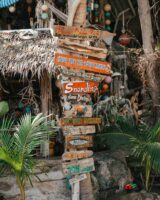
If you’ve seen my post on Phu Lanka, you’ll know I recently discovered a new obsession: cloud inversions at sunrise. There’s somthing etherial about watching clouds pool between layers of moiuntains, glowing orange at the first light of day.
Phu Lanka was the first time I saw such a thing, but I knew I had to see it again. And so, I discovered Ban Jabo. This small, unassuming village is nestled in the mountains just 90 minutes from Pai. However, despite its proximity, it’s often overlooked by backpackers.
In this post, I’ll show you how to experience Ban Jabo and witness this extraordinary natural phenomenon for yourself. Whether you decide to stay the night before or head there dark and early, here’s what you need to know.


Where Is Ban Jabo Village?
Ban Jabo is a tiny little village in the Mae Hong Son provice, NNorthern Thaialnd. This picturesque village sits high in the moiuntains, offering sweeping views and a serece escpe from busy cities nearby.
It’s located about 90 minutes north of Pai and just 75 minutes from Mae Hong Son. This makes it a perfect stop to add to your Northern Thailand itinerary, especially if you decide to venture out on the Mae Hong Son Loop.
While the journey offers stunning scenery, the mountain roads are narrow and winding. When driving, make sure to take the roads slowly and with care, especially during the rainy season. But, with a bit of caution, you should be perfectly safe.
Read Also: 2 Week Thailand Itinerary: Best for First Time Visitors

Why Visit Ban Jabo Village?
From its breathtaking sea of clouds to the traditions of the Black Lahu hill tribe, this small village offers a unique experience for travelers seeking authenticity and serenity.
The Sea of Clouds Phenomenon
One of Ban Jabo’s biggest draws is its “sea of clouds,” a mesmerizing sight that occurs at sunrise. The early morning fog pools between the mountains, glowing orange and pink as the sun rises. It’s a magical experience that feels like stepping into a dream.
The best time to witness this phenomenon is during the cooler months (November to February). Arrive before dawn to secure a good spot and enjoy the full transformation of the landscape.
Best Spots to See the Sea of Clouds:
The main viewpoint near the Noodle Soup House is popular, but it can get crowded with other travelers and drone pilots. The bustle can detract from the tranquility of the sunrise.
If you prefer a little more privacy, head further north to the other side of the village for a unique angle. As we were coming from Ban Mae Lana, we found several quiet sunset spots along the road with no one around – perfect for a peaceful morning.
Finnaly, head to Dekdoi Coffee Jabo as the sky begins to lighten. This café has viewing platforms where you can enjoy the view with a hot cup of coffee or cocoa. However, as it doesn’t open until 7 am, it’s best to head there for the last part of the sunrise.


Coffee with a View
Perched on stillts along the cliff’s edge, you’ll find a handful of cafes and restaurants offering panormaic views of the mountains and valleys below. These spots are perfect for enjoying a warm drink or a meal after you’re drive, soaking in the beauty of the surroundings.
One must-visit spot is Dekdoi Coffee Jabo, where I had a delicious Thai tea. Another popular spot is The Noodle Soup House. The simple yet delisious dishes are perfect for your eveingin meal or to warm you up early in the morning after sunrise.
Experiencing Black Lahu Culture
Ban Jabo is home to the Black Lahu hill tribe, native to China and Mynmar. In recent years, the trip has opened their community to tourism, teaching others about their traditions and many tour’s to Ban Jabo include visiting their homes.
When visiting, make sure to respect the community, seek permission before taking photos, and support local businesses when you can. Take time to engage with the locals and ask questions – they often enjoy sharing their culture with visitors.
However, it’s important to approach your visit thoughtfully. Avoid treating the village as a spectacle and prioritise sustainable tourism practices to ensure your presence benefits the community.
Read Also: Complete Guide to Sleeping on Thailands Floating Bungalows: Khao Sok National Park


How to Get to Ban Jabo Village
By Road
From Chiang Mai: Ban Jabo is approximately 5-6 hours away by car, following the Mae Hong Son Loop. The drive takes you through Pai and Soppong, two great stopover options.
From Pai: Ban Jabo is just 90 minutes north along Highway 1095. The route is scenic but includes steep curves, so drive carefully.
From Mae Hong Son: The village is about 3 hours east, making it a convenient addition to a Mae Hong Son loop itinerary.
Transportation options include:
Private transfers: Hire a driver from Pai or Mae Hong Son for a hassle-free trip
Self-drive: Rent a car or scooter for flexibility. Scooters are budget-friendly but less comfortable for long rides.
Public buses: Take a bus to Soppong, then arrange a local taxi or motorbike to Ban Jabo.
Travel Tips
- Road conditions: The roads are paved but narrow and winding, with sharp curves. Drive cautiously, especially in wet or foggy weather.
- Fuel stops: Fill up in Pai or Soppong, as fuel stations near Ban Jabo are limited.
- Navigation: Use apps like Google Maps or Maps.me, especially if you don’t have data.
- Packing essentials: Bring warm layers for early mornings, especially if traveling during cooler months
Tour Options
For those who prefer guided experiences, Ban Jabo can be included in a private tour of the Mae Hong Son region.
One excellent option is a private sunrise tour from Pai, which costs around £85 for two people. This tour includes:
- Watching the sunrise at Ban Jabo.
- Exploring Nam Lod Cave, one of the area’s natural wonders.
- Visiting Doi Kiew Lom Viewpoint for panoramic mountain views.
You can book this tour here. Guided tours like this are perfect for couples, travellers short on time or without their own transport.


Where to Stay in Ban Jabo Village
Local Homestays
Homestays in Ban Jabo are the best way to experience the village’s culture. Most options are not listed on major booking platforms and require direct contact to book. You can find the numbers for most accomodation through their location on Google Maps.
Be aware that, whilst some owners use WhatsApp for messaging, others may only have mobile numbers, so a local SIM card with call capabilities is helpful.
If you prefer to book online, Chution House has great reviews, is based right in the village, and is available to book in advance on Booking.com.
One highly recommended option in the village is Homestay on the Edge, or โฮมสเตย์ชายขอบ, which receives excellent reviews for its warm hospitality and picturesque location. Slightly out of the main village, you’ll get a unique vantage point.
As we booked when we arrived, most of the accomodation in Ban Jabo was fully booked. Instead, we took a 5 minute drive to the village over and stayed at Maelana Garden Guest House.
Here, the owner maintains a community garden, making you dinner using fresh ingredients from, providing a unique farm-to-table experience surrounded by rice fields and mountains. The accommodation is basic, featuring a mattress with a mosquito net anda rather rustic bathroom, but an interesting experience and incredible cheap.
What to Expect in Ban Jabo Homestays:
- Basic amenities: Expect simple sleeping arrangements. Bring your own toiletries, a power bank, and ensure you have data if you want to stay online as outlets and WiFi may be limited.
- Meals: Most homestays include dinner and breakfast as restaurants are limited in the area, however there may be an additional charge for each meal.
- Cultural immersion: Staying in a homestay lets you connect with locals, learn about their daily life, and support the community directly.
Booking Tips:
- Contact accommodations directly through WhatsApp or by phone.
- Guides or local tour operators can also assist with booking.
- Book early during peak travel months (November–February) to secure a spot.
Read Also: Complete Mae Hong Son Loop Guide: Itineraries, Tips, and Costs

When Is the Best Time to Visit Ban Jabo?
The timing of your visit to Ban Jabo can significantly influence your experience, especially if witnessing the “sea of clouds” is your main goal. Northern Thailand’s seasons bring varying weather, so it’s essential to plan accordingly.
Cool Season (November–February) – The Best Time to See the Sea of Clouds
This is the best time to visit Ban Jabo, as the cooler temperatures (10–25°C) create ideal conditions for the “sea of clouds.” Mornings are crisp, and the fog settles beautifully between the mountains, making sunrise an unforgettable sight.
Hot Season (March–May)
During this time, temperatures climb to 30–40°C, and haze from agricultural burning can obscure views. While the “sea of clouds” is less common, the village remains a peaceful retreat from busier destinations and the views during the day and at sunrise are still stunning.
Rainy Season (June–October)
Rainy days bring lush green landscapes, and the cooler temperatures are a welcome respite from the heat. However, heavy rainfall can make roads slippery and affect visibility for the “sea of clouds.”


The Wrap Up: How to See the Sea of Clouds at Ban Jabo Village
I’ll never forget waking up in the dark, bundling up against the crisp morning chill, and making my way to the village’s edge for sunrise.
As the first light crept over the horizon, the valley transformed. Clouds rolled in like a soft, endless sea, glowing orange and pink as the sun climbed higher.
Ban Jabo is an underestimated spot where you can really embrace its breathtaking beauty. I hope your experience is as magical as mine was, and that it leaves you with memories you’ll carry long after the clouds have cleared.







